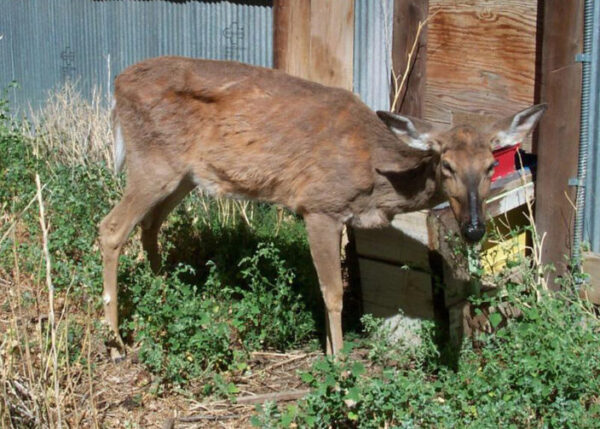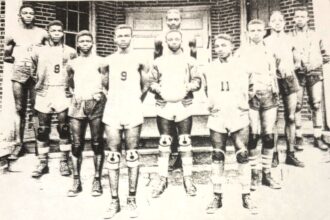Chronic Wasting Disease (CWD) has finally hit North Carolina’s deer herd.
Officials with the N.C. Wildlife Resources Commission announced today (Thursday) that a sample collected from a hunter-harvested, white-tailed deer in Yadkin County has tested positive for the disease.
CWD is caused by abnormal proteins, called prions, that slowly spread through a deer’s nervous system, eventually causing spongy holes in the brain that lead to death. The disease is spread between deer through direct contact and environmental contamination from infected saliva, urine and feces of live deer or carcasses and body parts. It is not transmissible to humans, but is similar enough to bovine spongiform encephalitis (“mad cow” disease) that officials encourage extreme sanitation measures to avoid spreading the disease.
The deer was harvested in northern Yadkin County in December 2021. The sample was sent in by a taxidermist through a cooperator program established by the Wildlife Commission. During the hunting season that ended Jan. 1, Wildlife Commission staff collected more than 7,200 samples from cooperators and hunters. Efforts were kicked into high gear due to the discovery of a CWD-positive deer 33 miles away from the North Carolina border last year in Montgomery County, Va. CWD deer have also been detected in Tennessee, West Virginia and other parts of Virginia.
This is the first case of CWD detected in North Carolina’s deer herd and was confirmed by the National Veterinary Services Laboratory in Ames, Iowa.
“We are appreciative of all the cooperating taxidermists, meat processors and hunters that have helped us with our CWD surveillance,” said Brad Howard, chief of Wildlife Commission’s Wildlife Management Division. “Their diligence helped us to detect the presence of CWD now, which is much better than if the disease had gone undetected. Now that we know the disease is in North Carolina we will implement our CWD Response Plan to help slow the spread of CWD while preserving our deer herd and deer hunting tradition.”
For several years, the state has required inspections of deer carcasses imported from other states. Capes and skulls are required to be cleaned and sanitized before being brought into the state for taxidermy.
While there has been only one confirmed positive to date, the Wildlife Commission continues to receive results from this year’s testing. At this time, the agency has received results from 60 percent (4,287) of all samples submitted, and 76 percent (626) of results from a four-county focal area (Alleghany, Surry, Stokes, and Rockingham) that was initiated because of the 2021 Virginia CWD-positive deer.
Now that a positive detection has been verified, agency staff will continue to follow the CWD Response Plan in collaboration with the N.C. Department of Agriculture and Consumer Science, and will continue to share the agency’s next steps with the public through multiple communication channels. The Wildlife Commission will meet on April 7 to discuss the CWD response, and public meetings in the impacted area will be announced as they are scheduled.
“Although the detection of CWD is bad news, we have been preparing for this possibility for decades,” Howard said. “Our long-term goal is to protect our deer herd and our deer hunting culture. Achieving that goal means we must work with our constituents to implement our response plan and refine our long-term management strategy.
“We’ve been in contact with wildlife professionals in other states that are already CWD-positive to learn from their experiences. Adapting to CWD is going to be a challenge for everyone, but I’m confident that our staff and North Carolina deer hunters can do it.”
Testing will continue, Howard said, but it’s nearly impossible to tell if a deer has CWD by observation. Signs of illness may not be apparent for 16 months or more after infection. The slow incubation period, ease of transmission, and the fact that there is no vaccine, treatment or cure make CWD a looming threat to the state’s white-tailed deer population and deer hunting traditions. Given enough time, the disease is always fatal.
For more information about CWD, including answers to frequently asked questions, visit ncwildlife.org/CWD. You can also watch this video for more about CWD.
https://www.youtube.com/watch?v=h7A47Mg-pFQ







